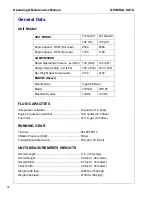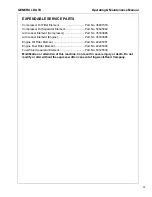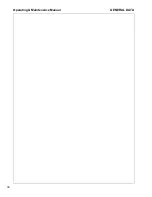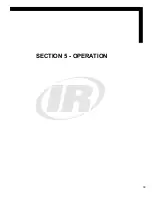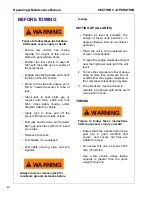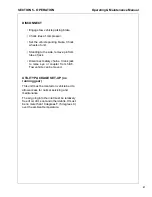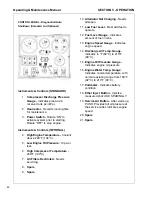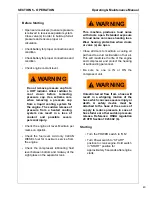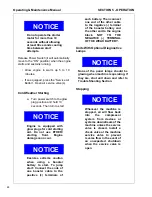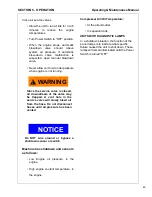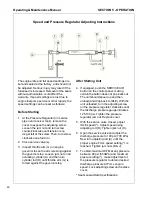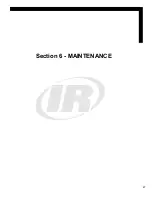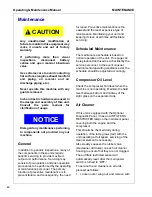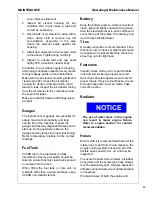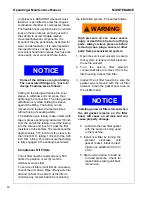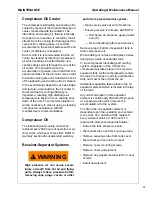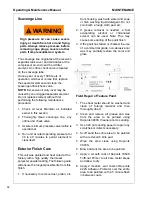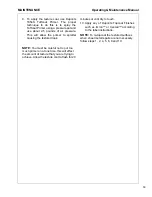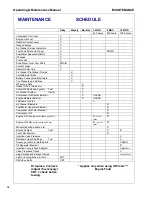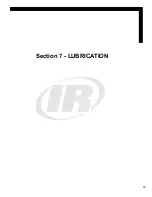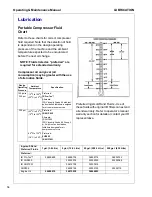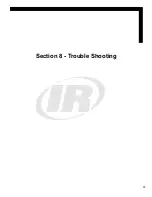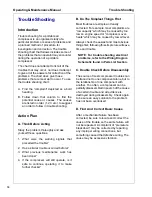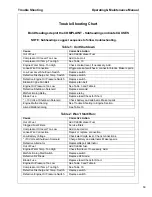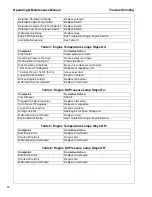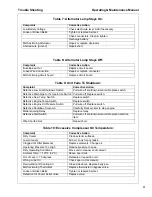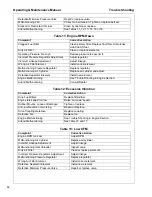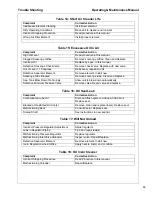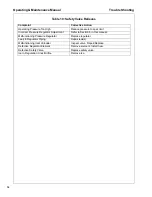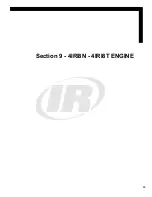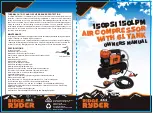
Operating & Maintenance Manual
MAINTENANCE
50
compressor is ASSURED whenever dust-
laden air is permitted to enter the engine’s
combustion chamber or compressor intake.
The flexible hoses used in the fuel, oil and air
lines on these units are primarily used for
their ability to accommodate relative
movement between components. It is
important they be periodically inspected for
wear and deterioration. It is also important
the operator does not use the hoses as
convenient hand hold or steps. Such use can
cause early cover wear and hose failure.
NOTICE
Some of the airlines are nylon tubing.
The associated fittings are “push-in”
design. Features are as follows:
Pulling on the tubing will cause the inner
sleeve to withdraw and compress, thus
tightening the connection. The tubing can be
withdrawn only while holding the sleeve
against the fitting. The tubing can be
removed and replaced numerous times
without losing its sealing ability.
To install the nylon tubing, make a mark (with
tape or grease pencil) approximately 7/8 inch
from the end of the tubing. Insert the tubing
into the sleeve and “push-in” past the first
resistance to the bottom. The mark should be
approximately 1/16 inch from the sleeve, for
the 3/8 inch O.D. tubing; 1/8 inch for the 0.25
inch O.D. tubing. This will ensure that tubing
is fully engaged in the sealing mechanism.
Compressor Oil Filters
The oil filter must be replaced every 500
hours of operation or six (6) months,
whichever comes first.
To service oil filters it will first be necessary
to shut the unit down. Wipe off any external
dirt and oil from the exterior of the filter to
minimize any contamination from entering
the lubrication system. Proceed as follows:
WARNING
!
High pressure air can cause severe
injury or death from hot oil and flying
parts. Always relieve pressure before
removing caps, plugs, covers or other
parts from pressurized air system.
1. Open the service air valve(s) to ensure
that system is relieved of all pressure.
Close the valve(s).
2. Turn the spin-on filter element
counterclockwise to remove it from the
filter housing. Inspect the filter.
3. Inspect the oil filter head to be sure the
gasket was removed with the oil filter
element. Clean the gasket seal area on
the oil filter head.
NOTICE
Installing a new oil filter element when
the old gasket remains on the filter
head, will cause an oil leak and can
cause property damage.
4. Lubricate the new filter gasket
with the same oil being used
in the machine.
5. Install new filter by turning the
element clockwise until
gasket makes initial contact.
Tighten an additional 1/2 to 3/
4 turn.
6. Start unit and allow to build up
to rated pressure. Check for
leaks before placing unit back
into service.
Summary of Contents for P185AWIR
Page 6: ...1 4...
Page 7: ...3 FOREWORD...
Page 8: ...4...
Page 10: ...6...
Page 11: ...7 DRAWBAR NOTICE...
Page 12: ...Operating Maintenance Manual 8...
Page 14: ...Operating Maintenance Manual 10...
Page 15: ...11 Section 1 Safety...
Page 19: ...Safety Operating Maintenance Manual 15...
Page 20: ...Operating Maintenance Manual Safety 16...
Page 22: ...Operating Maintenance Manual Safety 18...
Page 23: ...Safety Operating Maintenance Manual 19...
Page 25: ...21 Section 2 WARRANTY...
Page 30: ...Operating Maintenance Manual WARRANTY 26...
Page 32: ...Operating Maintenance Manual WARRANTY 28...
Page 33: ...29 Section 3 NOISE EMISSION...
Page 39: ...35 Section 4 GENERAL DATA...
Page 42: ...Operating Maintenance Manual GENERAL DATA 38...
Page 43: ...39 SECTION 5 OPERATION...
Page 51: ...47 Section 6 MAINTENANCE...
Page 59: ...55 Section 7 LUBRICATION...
Page 61: ...57 Section 8 Trouble Shooting...

